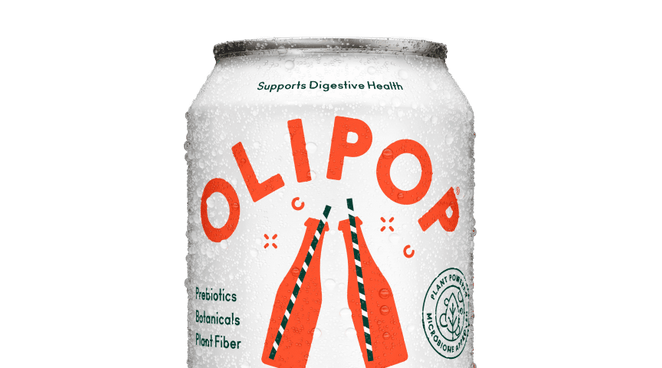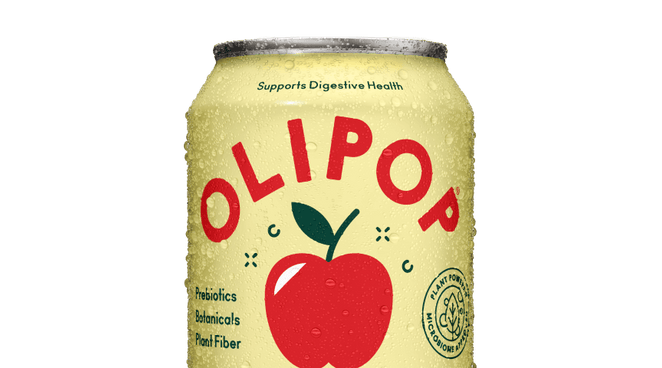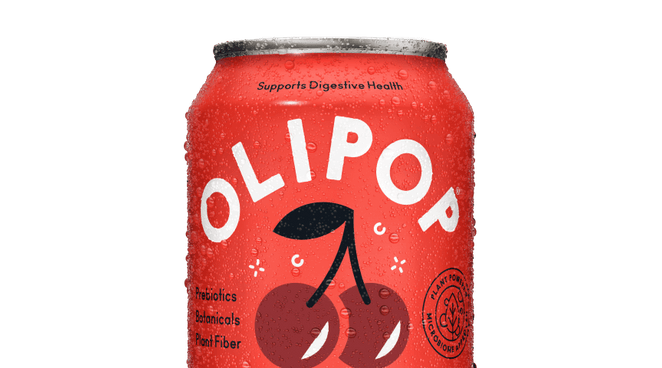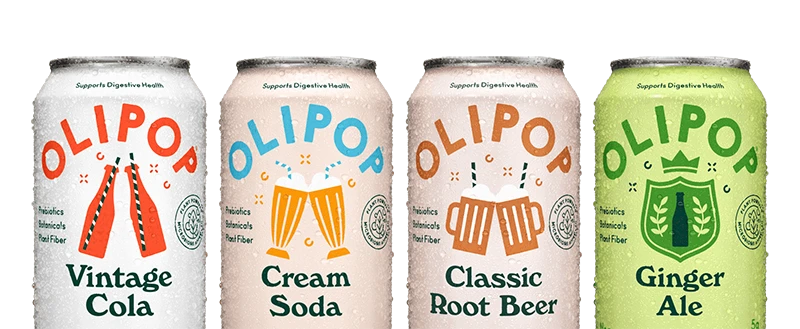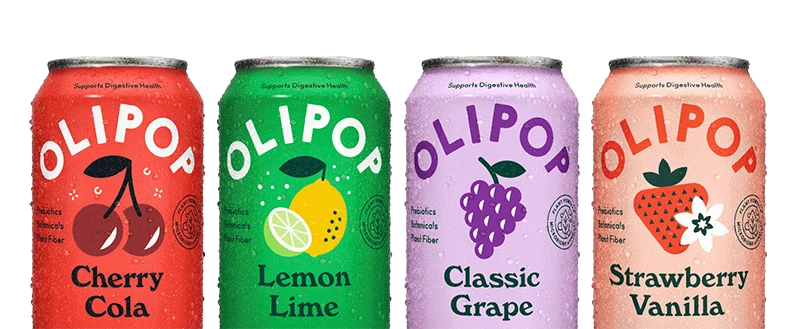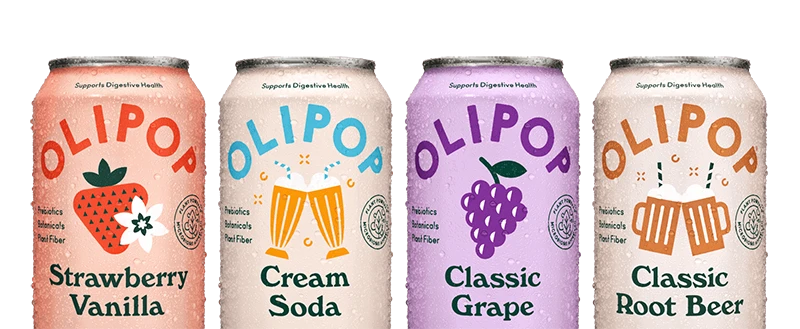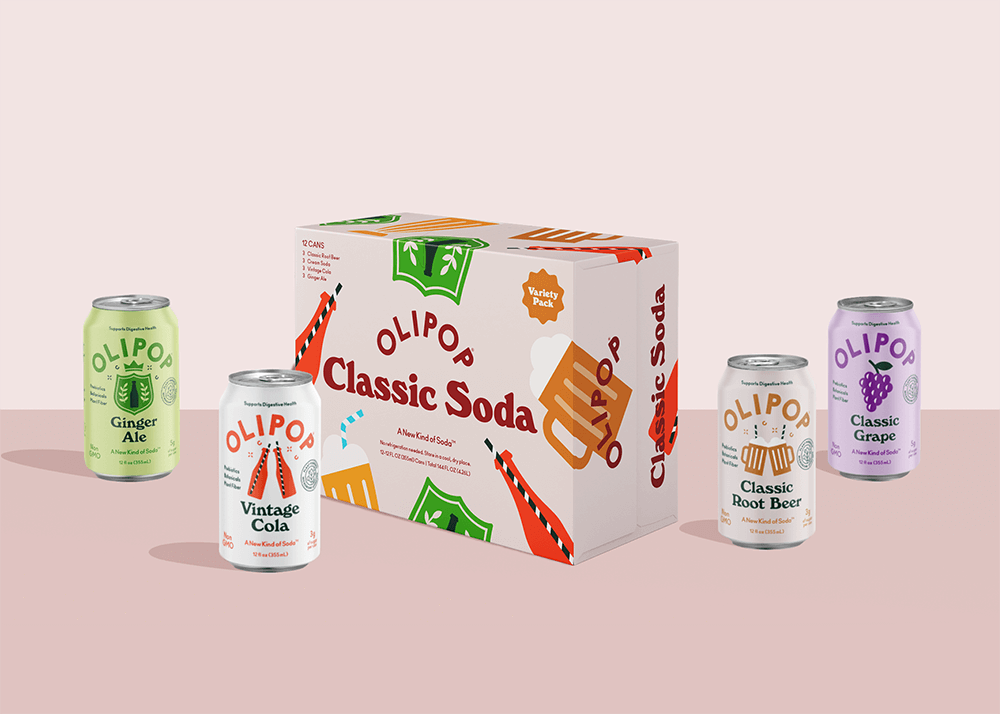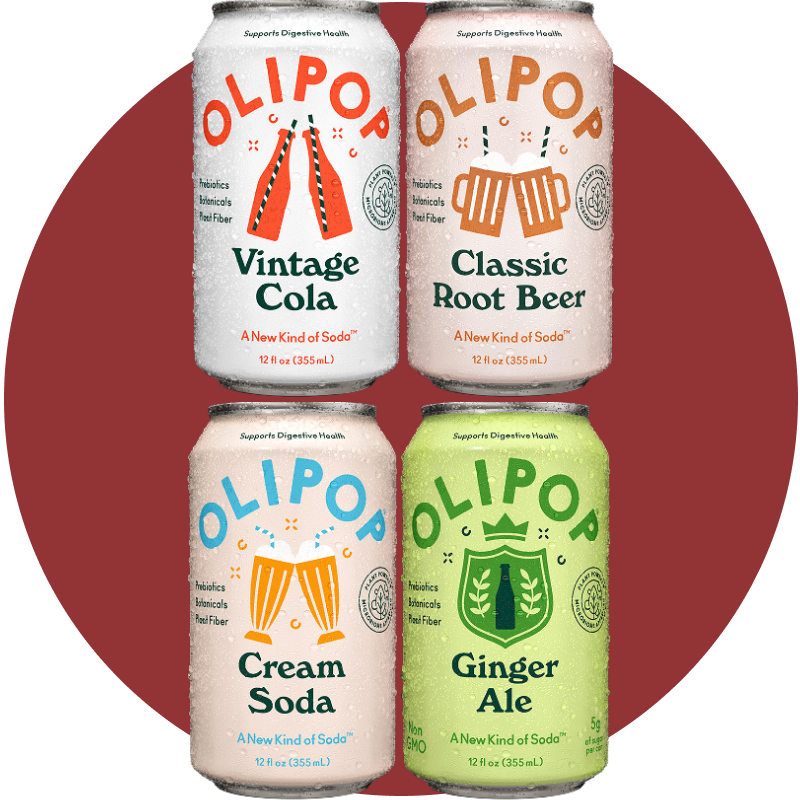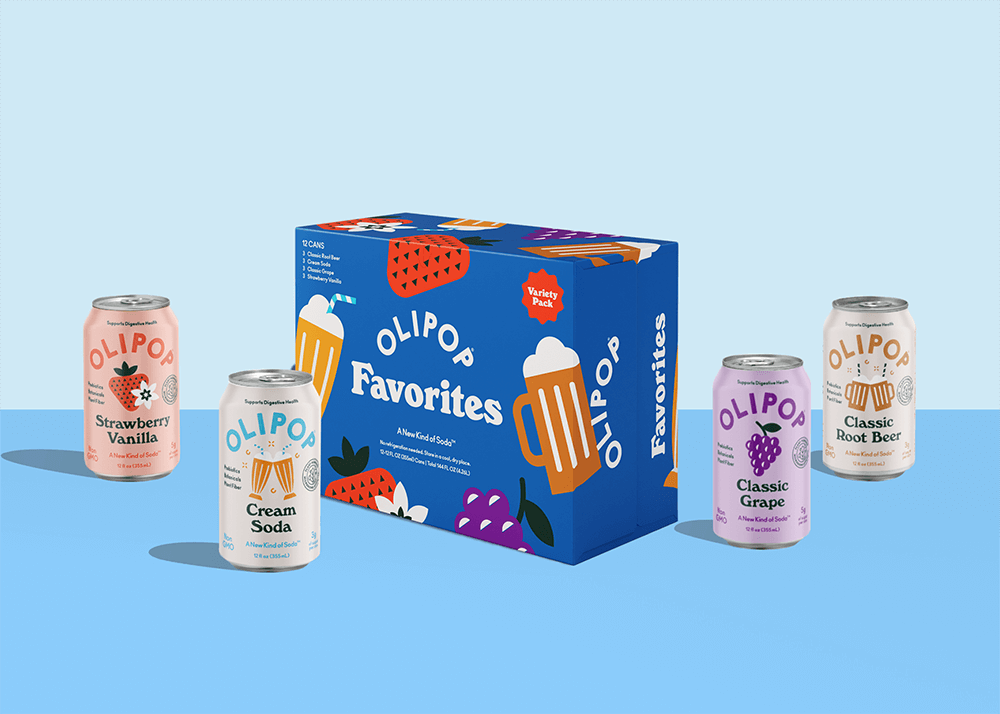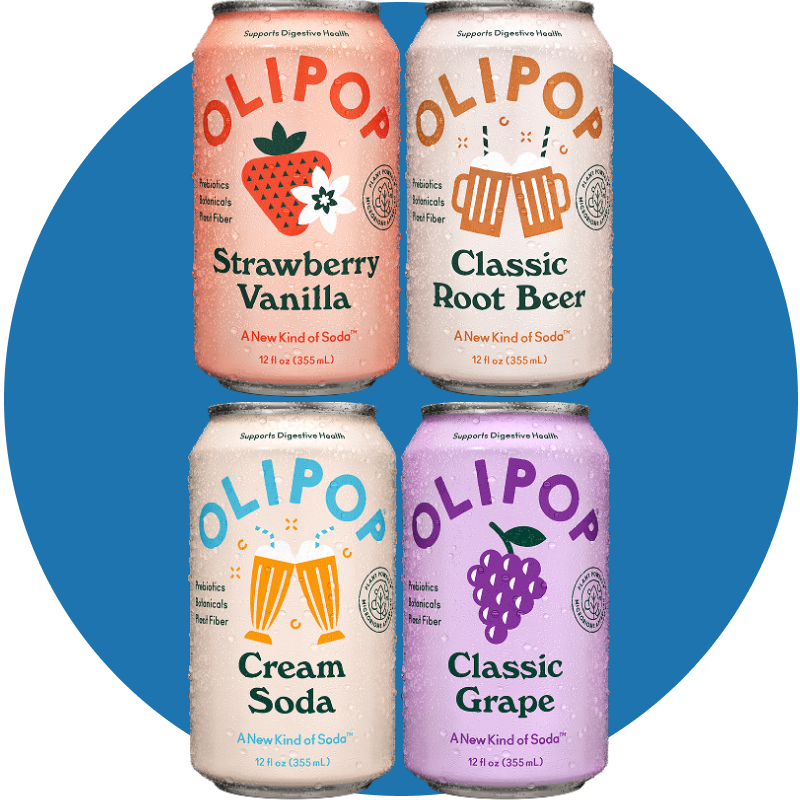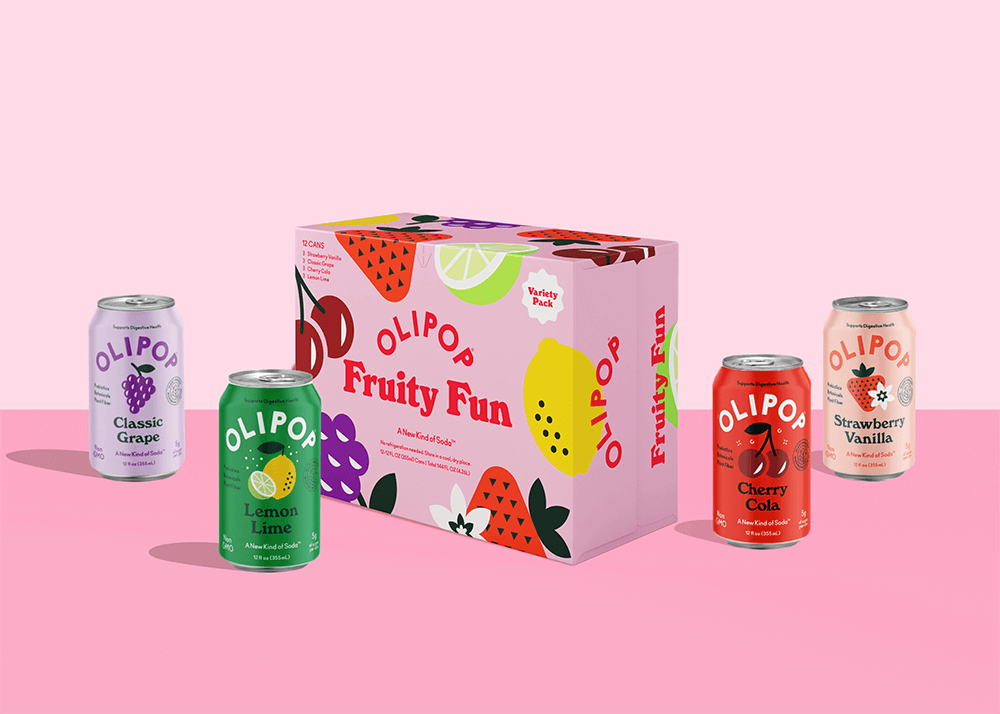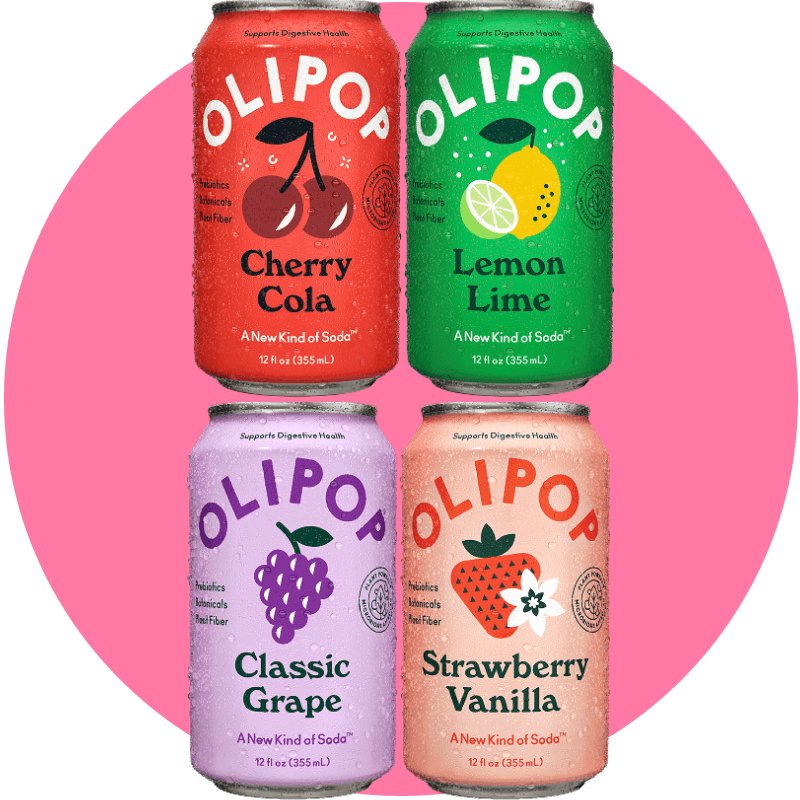At OLIPOP, we think about the gut… a lot. And for good reason! Your digestive system has a big job to do on a daily basis. Not only is it responsible for digestion and absorption, but it is also home to a large community of microorganisms, including beneficial bacteria.[1]
So, what exactly is the gut, and why does it matter? And what’s OLIPOP got to do with it? Let’s dig in.
What Is the Digestive System?
The digestive system is a series of connected organs that break down food and liquids into nutrients your body can absorb for energy, repair, and growth.[2] It all starts with your mouth and ends at the (ahem) finish line. Here’s the quick tour:[1]
- Mouth: Digestion begins with chewing or drinking.
- Esophagus: The food or liquid then heads down through this hollow, muscular tube into the stomach.
- Stomach: Acids and enzymes work their magic to break down the particles from your food and drink.
- Small intestine: Enzymes continue to break down the particles as nutrients and water are absorbed into your bloodstream.
- Large intestine: This is the home of various types of microorganisms, including beneficial bacteria. Bacteria thrive when they use prebiotic fiber as a food source to produce other beneficial bacteria and health-supporting metabolites, such as short-chain fatty acids.
- Anus: The rest of the undigested particles that remain? Pretty sure we all know where that goes!
But the digestive system is about more than just breaking things down. This system also plays a big role in your immune response, hormone production, and your mood.
What Exactly Is the Gut?
Your digestive system is collectively referred to as your “gut.” It involves your entire gastrointestinal (GI) tract, which includes the mouth, esophagus, stomach, small intestine, large intestine, and anus, as well as accessory organs including the liver, gall bladder, and pancreas.[1] In other words, the “gut” is a term we use to lump anything related to digestion together under one name.
We often refer to the gut as a “silent” organ. But don't be fooled; your gut is anything but quiet behind the scenes. It’s hard at work all day long, helping digest food, absorb nutrients, regulate your immune system, and even communicate with your brain via the gut-brain axis.[3]
Meet Your Microbiota
Here’s where it gets even more interesting. Your gut is home to trillions of microorganisms, including bacteria, fungi, and viruses, collectively known as the gut microbiota. The collection of genetic material found within these microorganisms is called your microbiome.[4] (Side note: We often use the terms “microbiota” and microbiome” interchangeably, even though they are technically different.)
Now, before you go thinking, “bacteria in my body?! No thanks!”, it’s important to remember, these microbes aren’t intruders. They’re essential.
Your gut microbiota helps:[4]
- Break down food or liquids and absorb nutrients
- Keep bowel movements regular and digestion on track
- Support immune function (around 70% of your immune system lives in the gut!)[5]
- Maintain a balanced mood via the gut-brain connection
That last one might surprise you. Let’s talk about that next.
Digestive Health & the Gut-Brain Axis
Ever felt butterflies before a big moment? Or had nerves send you straight to the bathroom? That’s your gut-brain axis at work.
The gut-brain axis (GBA) is a complex two-way communication pathway between the central nervous system (your brain and spinal cord) and the enteric nervous system (the nervous system of your gut).[6] This pathway connects the emotional and cognitive centers of your brain with your intestinal functions.
In other words, your gut and brain are talking to each other. This connection helps explain why your gut can influence mood and stress levels, and vice versa. This connection can play a critical role in maintaining homeostasis (aka a harmonious balance) of the gastrointestinal, central nervous, and microbial systems. [6] [7] It’s also why many scientists refer to the gut as the “second brain.”
Why Balance Matters
As we learn more about the role of the gut microbiome and how it impacts health, it’s increasingly evident that maintaining a balanced, healthy, and diverse gut microbiota is essential to your health and well-being. [8] [9]
Why is that exactly? Well, think of your microbiome as a bustling city: diverse, active, and full of moving parts. When things are in balance, everything hums along. But when that balance is off? It can impact digestion, immunity, mood, and more.
And like cities, no two microbiomes are exactly alike. Your gut’s composition is influenced by things like:[10] [11]
- How you were delivered at birth
- Where you grew up
- Your diet and lifestyle
- Your environment and stress levels
In short: your gut is uniquely yours. And taking care of it (and supporting that harmonious balance) is about making small, intentional choices that support a thriving internal ecosystem.
Can Diet Really Make a Difference?
Absolutely. As the saying goes, you are what you eat. While an adage, it happens to be accurate, right down to your gut's microbes! In fact, what you eat and drink may be the single biggest influence on your gut microbiota, with studies showing that dietary changes can affect up to 50% of its composition.[12]
Significant changes in your diet can alter the composition of your gut microbes within days. And long-term patterns have even more impact.[13] The underlying message: for your digestive system to function properly, you’ve got to feed the good bacteria in your body.
But... how do you do that?
How to Support Your Digestive Health
Consume More Fiber
Fiber is kind of a celebrity in the gut world. It keeps your digestive system running smoothly, feeds your beneficial microbes, and supports overall GI function. But...most of us aren’t getting enough.[14]
According to the 2020-2025 USDA Dietary Guidelines for Americans, women and men need between 25 to 38 grams of fiber per day. Yet, more than 90% of women and 97% of men don’t get anywhere near that recommended amount.[14]
The good news? Upping your fiber doesn’t mean overhauling your life. Simple swaps like choosing whole grains over refined ones, snacking on fruits and veggies, and reaching for fiber-rich snacks and beverages (hi, OLIPOP!) can all help bridge the fiber gap.
Add Prebiotics
Prebiotics are special types of fiber that feed the good bacteria in your gut. These microbes help break down parts of your food that your body can’t digest on its own.[15]
And yep, OLIPOP is packed with prebiotics, including:
- Shelf-stable Formula: Acacia fiber, guar fiber, and resistant dextrins from cassava root
- Refrigerated Formula: Inulin from chicory root and Jerusalem artichoke, and resistant dextrins from cassava root
No matter which formula you’re choosing, it’s a deliciously simple way to support your gut microbiota.
Embrace Diet Diversity
Want a thriving gut? Eat and drink like it! A diverse microbiome needs a diverse diet, especially when it comes to plants.[16]
That's what The Microsetta Initiative, a crowdfunded citizen science project that studies bowel movements (yup, you read that right!), says. They discovered that people who ate 30+ different types of plants per week had significantly more microbial diversity than those who ate fewer than 10.[17] So go ahead and mix it up: more colors, more types, and more gut-loving goodness.
The Importance of Digestive Health: The Takeaway
Your digestive system is so much more than a food processor. It’s a key player in your immune health, mood regulation, and overall well-being. From nutrient absorption to brain communication, your gut really does it all.
And supporting it doesn’t have to be complicated. Our advice? Go ahead and crack open a can of soda. (Wait, what?) If that feels like a plot twist, it’s because OLIPOP is no ordinary soda. OLIPOP contains a blend of prebiotics and plant fiber to support your digestive health, with less sugar than traditional soda and full-on flavor your taste buds are craving.
So, whether you’re here for the fiber, the flavor, or the whole digestive health package, just know we’ve got your back (and your gut).
Sources:
- Your Digestive System & How it Works. (2025, August 27). National Institute of Diabetes and Digestive and Kidney Diseases. https://www.niddk.nih.gov/health-information/digestive-diseases/digestive-system-how-it-works
- Harvard Health. (2023, July 18). The gut-brain connection. https://www.health.harvard.edu/diseases-and-conditions/the-gut-brain-connection
- Ursell, L. K., Metcalf, J. L., Parfrey, L. W., & Knight, R. (2012). Defining the human microbiome. Nutrition Reviews, 70, S38–S44. https://doi.org/10.1111/j.1753-4887.2012.00493.x
- Kumar, S., Mukherjee, R., Gaur, P., Leal, É., Lyu, X., Ahmad, S., Puri, P., Chang, C., Raj, V. S., & Pandey, R. P. (2025). Unveiling roles of beneficial gut bacteria and optimal diets for health. Frontiers in Microbiology, 16. https://doi.org/10.3389/fmicb.2025.1527755
- Holscher, H. D. (2017). Dietary fiber and prebiotics and the gastrointestinal microbiota. Gut Microbes, 8(2), 172–184. https://doi.org/10.1080/19490976.2017.1290756
- Akpinar, O. (2018). The gut-brain axis: interactions between microbiota and nervous systems. Journal of Cellular Neuroscience and Oxidative Stress, 10(3), 783. https://doi.org/10.37212/jcnos.610103
- Güven, B., Gülerman, F., Akyüz, E., & Aydın, G. (2020). Emotional dysregulation in adolescents with functional gastrointestinal disorders. Arab Journal of Gastroenterology, 21(1), 24–27. https://doi.org/10.1016/j.ajg.2020.02.002
- Thursby, E., & Juge, N. (2017). Introduction to the human gut microbiota. Biochemical Journal, 474(11), 1823–1836. https://doi.org/10.1042/bcj20160510
- Carabotti, M., Scirocco, A., Maselli, M. A., & Severi, C. (2015, June 1). The gut-brain axis: interactions between enteric microbiota, central and enteric nervous systems. https://pmc.ncbi.nlm.nih.gov/articles/PMC4367209/
- Coelho, G. D. P., Ayres, L. F. A., Barreto, D. S., Henriques, B. D., Prado, M. R. M. C., & Passos, C. M. D. (2021). Acquisition of microbiota according to the type of birth: an integrative review. Revista Latino-Americana De Enfermagem, 29. https://doi.org/10.1590/1518.8345.4466.3446
- Gilbert, J. A., Blaser, M. J., Caporaso, J. G., Jansson, J. K., Lynch, S. V., & Knight, R. (2018). Current understanding of the human microbiome. Nature Medicine, 24(4), 392–400. https://doi.org/10.1038/nm.4517
- Cryan, J. F., O’Riordan, K. J., Cowan, C. S. M., Sandhu, K. V., Bastiaanssen, T. F. S., Boehme, M., Codagnone, M. G., Cussotto, S., Fulling, C., Golubeva, A. V., Guzzetta, K. E., Jaggar, M., Long-Smith, C. M., Lyte, J. M., Martin, J. A., Molinero-Perez, A., Moloney, G., Morelli, E., Morillas, E., . . . Dinan, T. G. (2019). The Microbiota-Gut-Brain axis. Physiological Reviews, 99(4), 1877–2013. https://doi.org/10.1152/physrev.00018.2018
- Oriach, C. S., Robertson, R. C., Stanton, C., Cryan, J. F., & Dinan, T. G. (2016). Food for thought: The role of nutrition in the microbiota-gut–brain axis. Clinical Nutrition Experimental, 6, 25–38. https://doi.org/10.1016/j.yclnex.2016.01.003
- U.S. Department of Agriculture and U.S. Department of Health and Human Services. (2020, December). Dietary Guidelines for Americans, 2020–2025 (9th Edition). https://www.dietaryguidelines.gov/sites/default/files/2021-03/Dietary_Guidelines_for_Americans-2020-2025.pdf
- Rowland, I., Gibson, G., Heinken, A., Scott, K., Swann, J., Thiele, I., & Tuohy, K. (2017). Gut microbiota functions: metabolism of nutrients and other food components. European Journal of Nutrition, 57(1), 1–24. https://doi.org/10.1007/s00394-017-1445-8
- Heiman, M. L., & Greenway, F. L. (2016). A healthy gastrointestinal microbiome is dependent on dietary diversity. Molecular Metabolism, 5(5), 317–320. https://doi.org/10.1016/j.molmet.2016.02.005
- 30 plants per week: Why eating more fruits and vegetables matters for your gut Microbiome. (2024, July 11). The Microsetta Initiative. https://microsetta.ucsd.edu/30-plants-per-week/
- Your gut does more than digest: it supports immunity, mood, and overall well-being.
- Diet and lifestyle choices (hello, fiber!) help support a balanced, thriving microbiome.
- OLIPOP combines a blend of functional ingredients to support your digestive health with less sugar than traditional soda.


